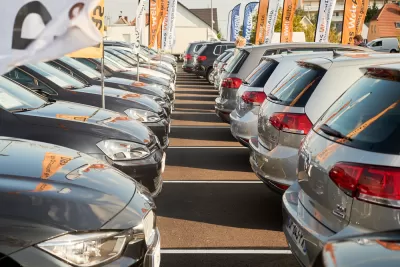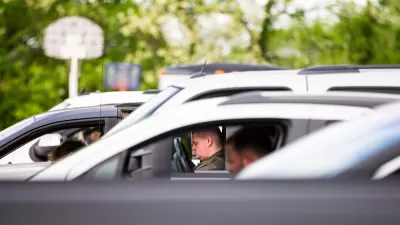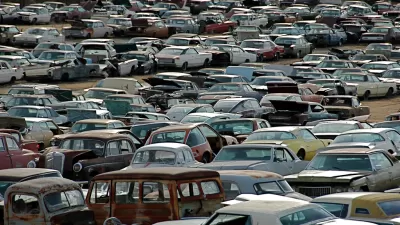Clearly, the American love affair with the automobile is far from over, despite lessons from the recession, dire environmental warnings, plummeting traffic safety, or the wishful thinking of tech companies.

Aarian Marshall pumps the break on a politically useful narrative about the demise of car ownership in the United States. Ride-hailing companies and car sharing companies claim private ownership of cars is an outdated concept, cities block streets to cars partly from the assumption that there's growing demand for car-free places, and Census data have shown a growing number of households without cars.
Still, there's an elephant in the room, according to Marshall: "Personal car ownership in the US has actually increased in the past 10 years, even in the frenzied urban places where Uber and car-share have become verbs."
There's more. "According to research from former New York City transportation official Bruce Schaller, the number of vehicles has grown faster than the population in some of the cities where ride-hail is most popular: Boston, Los Angeles, New York, Philadelphia, and Chicago."
Companies that were built on the assumption that fewer people would want to own cars in the future have also "hit the skids," according to Marshall, like Car2Go.
The reversion to the car-centric mean could be traced to post-recession austerity, according to experts cited by Marshall in the article. Unmentioned, however, is the kind of cars are buying. Consumer trends in the United States have shifted back to large vehicles, as full-size SUVs and pick-up trucks again are best sellers in the United States, despite evidence that they are unsafe for everyone inside the car and out.
FULL STORY: The Death of Cars Was Greatly Exaggerated

Planetizen Federal Action Tracker
A weekly monitor of how Trump’s orders and actions are impacting planners and planning in America.

Restaurant Patios Were a Pandemic Win — Why Were They so Hard to Keep?
Social distancing requirements and changes in travel patterns prompted cities to pilot new uses for street and sidewalk space. Then it got complicated.

Map: Where Senate Republicans Want to Sell Your Public Lands
For public land advocates, the Senate Republicans’ proposal to sell millions of acres of public land in the West is “the biggest fight of their careers.”

Maui's Vacation Rental Debate Turns Ugly
Verbal attacks, misinformation campaigns and fistfights plague a high-stakes debate to convert thousands of vacation rentals into long-term housing.

San Francisco Suspends Traffic Calming Amidst Record Deaths
Citing “a challenging fiscal landscape,” the city will cease the program on the heels of 42 traffic deaths, including 24 pedestrians.

California Homeless Arrests, Citations Spike After Ruling
An investigation reveals that anti-homeless actions increased up to 500% after Grants Pass v. Johnson — even in cities claiming no policy change.
Urban Design for Planners 1: Software Tools
This six-course series explores essential urban design concepts using open source software and equips planners with the tools they need to participate fully in the urban design process.
Planning for Universal Design
Learn the tools for implementing Universal Design in planning regulations.
Heyer Gruel & Associates PA
JM Goldson LLC
Custer County Colorado
City of Camden Redevelopment Agency
City of Astoria
Transportation Research & Education Center (TREC) at Portland State University
Camden Redevelopment Agency
City of Claremont
Municipality of Princeton (NJ)





























